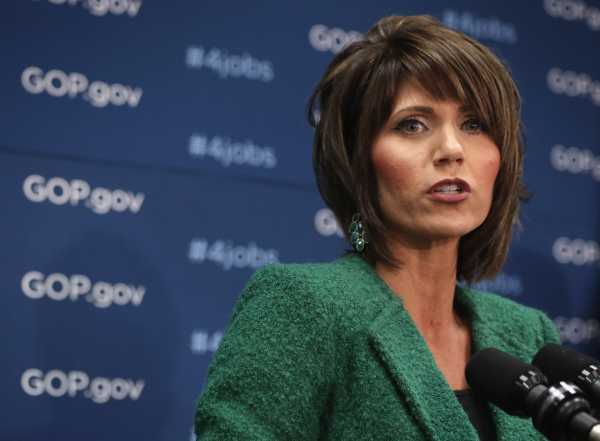
The winning streak for women candidates continued in Tuesday’s primary elections.
Not only were women represented in unprecedented numbers as candidates, they also walked away with a raft of key wins: According to Bloomberg, 41 of the 92 women, or nearly half, running for the House or Senate are expected to advance in their races.
Women also dominated a slew of statewide contests, including governors’ races in South Dakota and Alabama. And while a majority of Tuesday’s wins were on the Democratic side, much like those in previous primaries this year, Republican women in California and New Mexico saw some victories as well.
The results only serve to reinforce a trend throughout the midterms so far: With a record number of women running this cycle, a record number are winning and will be on the ballot in the fall. Here’s a full rundown of how women candidates did during Tuesday’s primaries.
Women ran away with governors’ races
In the five states that held them on Tuesday, women crushed primaries for governor. California was the only one that didn’t end up choosing a woman as a contender on either side of the aisle.
Rep. Kristi Noem — after a recent poll put her neck and neck with state Attorney General Marty Jackley — ended up capturing the South Dakota Republican primary by more than 10 points.
Noem has represented the state for four terms in the House and would become its first woman governor if she wins in November. Given the state’s heavily Republican leanings, her chances of taking the governor’s mansion — and beating out Democratic challenger Billie Sutton — are high.
Meanwhile in New Mexico, Rep. Michelle Lujan Grisham swept a three-way contest for the Democratic nomination, setting her up to face off against fellow Rep. Steve Pearce in the fall.
Women incumbents in Alabama and Iowa also advanced to the general election. Sitting Alabama Gov. Kay Ivey, who took on the role after Robert Bentley resigned in the wake of a scandal pertaining to an affair, received more than 55 percent of the vote, holding off a deep bench of challengers and bucking speculation about a possible runoff. Iowa Gov. Kim Reynolds ran unopposed for the Republican nomination.
A key milestone for women of color
Deb Haaland, the former chair of the New Mexico Democratic Party, walked away handily with the Democratic primary in the state’s First Congressional District — a key step that could lead to Haaland becoming the first Native American woman ever elected to the House.
“A lot of people recognize disparity in our elected offices,” Haaland told the Huffington Post. “And when you stop to think about how women like me have never seen ourselves in our U.S. Congress, it makes them pause.”
Haaland took on several competitors in the primary including former US Attorney Damon Martinez and retired University of New Mexico law professor Antoinette Sedillo Lopez. Her district is pretty safely Democratic, meaning she’ll likely be the pick this fall.
Women will be representing Democrats in key pickup districts
As Democrats try to flip the House in the general election, women will be representing the party in a number of key districts currently held by Republicans.
Mikie Sherrill, a former prosecutor and Navy pilot, secured more than three-quarters of the vote in New Jersey’s 11th Congressional District. This win will pit her against Republican nominee Jay Webber in a race to take over a seat vacated by Rep. Rodney Frelinghuysen. Frelinghuysen is one of a record number of House Republicans who have opted to retire in lieu of pursuing reelection, prompting Democrats to target the district.
Sherrill is off to a strong start: She’s already accrued a massive war chest and several high-profile endorsements including that of former Vice President Joe Biden.
In Iowa’s Third Congressional District — which Cook Political Report has rated as R+1, meaning it’s basically a tossup — small-business owner Cindy Axne is the Democratic pick to go up against current Republican incumbent Rep. David Young. Health care is expected to be a central issue for the two candidates, with Axne campaigning on a plan to fix Obamacare.
The youngest member of the House could be a woman
Abby Finkenauer, a 29-year-old state representative, would become the youngest member of the House if she’s elected in the midterms. Finkenauer earned more than two-thirds of the Democratic primary vote in Iowa’s First Congressional District on Tuesday and will take on Rep. Rod Blum, who has long been in Democrats’ crosshairs.
Votes are also still being counted for California’s 49th District, where former State Department contractor Sara Jacobs is duking it out in a “top two” primary for a chance to vie for Rep. Darrell Issa’s seat. Jacobs, who is also 29, has run a nonprofit and worked as an unpaid foreign policy adviser on the Hillary Clinton campaign.
Meanwhile, one Republican woman’s Trump comments likely forced her into a runoff
Alabama Rep. Martha Roby, one of the first Republican House members to withdraw her endorsement of Donald Trump after the Access Hollywood tape was published in 2016, was forced into a runoff after failing to secure enough votes to win the party’s nomination outright on Tuesday.
Former Rep. Bobby Bright, her opponent in the Republican primary (who previously held the seat — as a Democrat), has made Roby’s critique of the president the cornerstone of his attack ads: “Roby turned her back on the president when he needed her most,” one said.
Roby, after falling short of the 50 percent threshold to secure the nomination, now faces a runoff election against Bright on July 17.
Sourse: vox.com






